Your Cart is Empty
FREE SHIPPING ON ALL ORDERS $75+
“Full spectrum CBD” refers to a product made from whole-plant hemp extract. This extract material preserves the hemp’s natural state, unlike highly refined isolated CBD products.
So, what's that mean?
It means that full spectrum CBD products will contain high concentrations of CBD, but will also have trace amounts of other plant materials. This usually includes other cannabinoids, like THC, GBG, CBN, and CBDa, as well as a variety of other plant compounds from hemp, like terpenes.
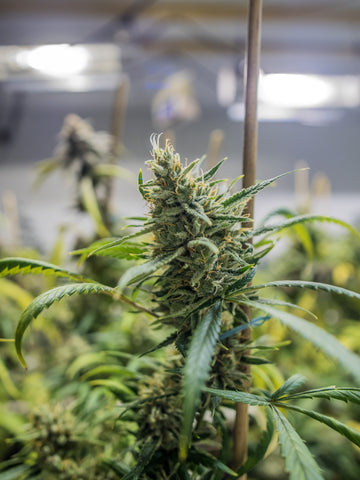 Full spectrum hemp extract can be sourced from marijuana strains or from hemp, but the kind of full spectrum CBD products that are legal for sale across the U.S. (in accordance with the 2018 Farm Bill) are sourced from industrial hemp.
Full spectrum hemp extract can be sourced from marijuana strains or from hemp, but the kind of full spectrum CBD products that are legal for sale across the U.S. (in accordance with the 2018 Farm Bill) are sourced from industrial hemp.
Industrial hemp, by definition, must contain less than 0.03% THC, along with meeting other industry standards.
That means that full spectrum CBD products sourced from industrial hemp will also contain less than 0.3% THC. Regardless of their source, full spectrum CBD will always contain at least trace amounts of THC.
Hemp products that contain a collection of cannabinoids but have non-detectable levels of THC (often labeled 0% THC) are more accurately called “broad spectrum CBD products.” However, these products are frequently mislabeled as full spectrum products.
Broad spectrum products seek to offer the benefits of whole-plant formulas, but without the risk of THC contamination. They offer a middle ground between CBD isolates and full spectrum products.
Still, many people seek out true full spectrum CBD products in search of "the entourage effect."
If you've never heard of the entourage effect, the basic idea is simple. The theory suggests that CBD, THC, and all of hemp’s minor cannabinoids and terpenes work together to boost each other’s effects.
This proposed synergistic effect between cannabinoids is still being researched, but this wildly popular theory is the main selling point behind full spectrum CBD's popularity.
That doesn't mean these whole-plant formulas come without concern, though. Many people avoid even trace amounts of THC for fear of a false-positive drug test. Others say that this fear is unjustified, and that full spectrum CBD is the only way to go.
What's the truth?
CBD Isolate, Full Spectrum CBD, and Broad Spectrum CBD are all likely beneficial and pose their own unique benefits for new and experienced CBD users.
Table of Contents
Full Spectrum Benefits
Full Spectrum Uses
Full Spectrum Effects
Will Full Spectrum CBD Get You High?
Why Do Full Spectrum CBD Effects Vary?
Types of Full Spectrum CBD Products
How is Full Spectrum CBD Made?
Lab Testing for Full Spectrum CBD
Can Full Spectrum CBD Go Bad?
What Does Full Sepctrum CBD Taste Like?.
Will Full Spectrum CBD Make Me Fail a Drug Test?
Key Takeaways
Resources
There are numerous reported benefits of CBD, but many of these reports fail to specify if these benefits come from full spectrum CBD products or from isolated CBD.
Further, there are not many reliable, unbiased reports evaluating the difference in effects between full spectrum and isolate products.
Research suggests that CBD isolate doses may result in a bell-shaped response curve in which higher doses are actually less effective. This same study reveals that full spectrum CBD may help avoid this efficacy curve.
In other words, the efficacy of full spectrum CBD may continue to increase as the dose increases.
Full Spectrum products are easily the most diverse type of CBD product on the market, so you’ll be able to find an option that meets your needs for potency, flavor, dosing style, and more.
The product selection is so wide that you can easily find products that offer 1mg per dose or 100mg per dose, as well as natural, hemp flavored products and bold, exciting, or refreshing flavors.
Unlike medicinal THC products, full spectrum products made from industrial hemp are legal for manufacturing and sale under the 2018 Farm Bill.
That means that while THC-based therapies may be out of reach, many people are able to reap similar benefits from full spectrum CBD products instead.
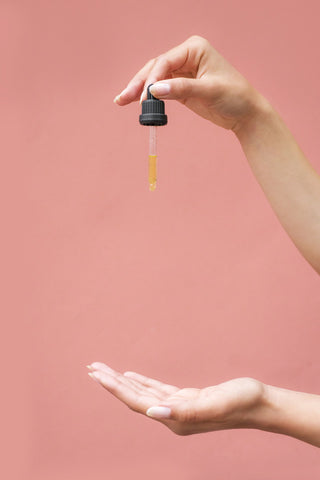 There’s been plenty of argument about which form of CBD is superior—full spectrum or CBD isolate—and there’s still no conclusive evidence that highlights and compares the benefits of each formula.
There’s been plenty of argument about which form of CBD is superior—full spectrum or CBD isolate—and there’s still no conclusive evidence that highlights and compares the benefits of each formula.
Still, many people argue that the entourage effect makes full spectrum CBD products more effective and more useful for a wide variety of ailments.
A cross-sectional study of over 2,400 people shows that nearly 62% of people surveyed used CBD to treat a medical condition, with the top three medical conditions treated being anxiety, pain, and depression.
According to a review published in Surgical Neurology International, previous neurological uses and research span across a wide range of conditions, from brain tumors and neuropathic pain to mood disorders, post traumatic stress, and more. More information is needed to understand how CBD may impact these conditions.
Another study involving 272 epileptic patients looked at the benefits of artisanal cannabis strains, the majority of which were cannabidiol (CBD)-enriched artisanal formulas.
The results from these full-spectrum products were promising--35% of people experienced a 26-75% reduction in seizures, 28% of people experienced a 76-99% reduction in seizures, and 10% experienced a “complete clinical response.”
Between ongoing research efforts and widespread anecdotal evidence, it’s easy to see that CBD has a multitude of potential uses. Generally speaking, full spectrum formulas are the most popular CBD products chosen for therapeutic use.
Very few arguments exist against using full-spectrum formulas.
One theory argues that CBD without THC is better for anxiety. This is based on limited evidence suggesting that THC may cause paranoia or can incite anxiety in some people, but it’s unknown whether trace amounts of THC cause these effects.
Still, the “entourage effect” argument suggests that any negative impact caused by even trace amounts of THC would be offset by the high CBD-content of full spectrum products.
One meta-analysis looks at the different effects of full spectrum CBD and CBD isolate for patients with epilepsy, and suggests that full spectrum products may have an advantage.
Of those that tried CBD treatment, “there were more reports of improvement from patients treated with CBD-rich extracts (71%) than patients treated with purified CBD (46%). Those using full spectrum CBD also reported taking a lower average dose than those using CBD isolate.
Generally, the benefits of full spectrum and CBD isolate are likely very similar since they both balance on the power of the same CBD molecule.
Even though CBD itself has a multitude of potential benefits, the actual effects you feel from CBD shouldn’t vary much from batch to batch or product to product.
In fact, at the core of every high-quality cannabidiol product is one unchanged molecule (the CBD molecule) which has very mild effects on it’s own.
Unlike THC (the main component in marijuana), CBD is not psychoactive and won’t make you feel high.
Aside from feeling relief from your targeted symptoms, CBD shouldn’t produce many noticeable effects at all. Some people report a mild euphoric feeling, enhanced mood, or energy boost.
These effects may be directly tied to the effects of CBD on the Endocannabinoid System, but it’s also likely some effects are a result of relief from symptoms that were otherwise holding you back.
Some people report that CBD makes them sleepy, while others have argued that this effect is dose-dependent. Others suggest that besides relief from targeted symptoms, they feel nothing at all when they take CBD.
Really, the effects may have a lot to do with the hemp formula and what cannabinoids and terpenes it contains.
If you do feel some intense reaction, like psychoactive effects, dizziness, nausea, paranoia, or other adverse side effects, it’s likely that you’ve gotten a poor-quality or contaminated product.
Many low-quality CBD manufacturers have been known to cut corners by using synthetic cannabinoids or other low-quality ingredients that may cause harm, which is why it’s important to always check the test results before you buy a CBD product.
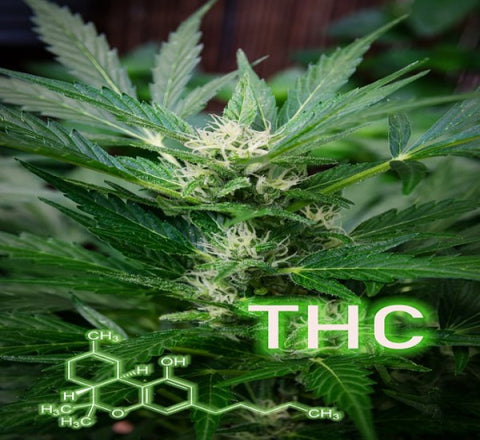 Many people wonder about the effects from full spectrum CBD products since they do contain trace amounts of THC, the psychoactive component in cannabis.
Many people wonder about the effects from full spectrum CBD products since they do contain trace amounts of THC, the psychoactive component in cannabis.
Federal legislation suggests that legal CBD products must contain less than 0.3% THC. Typically, this small amount is nowhere near enough to cause a psychoactive effect.
At maximum allowance, a 20mg dose of full spectrum hemp extract will contain 0.006mg of THC. That’s up to 800 times less psychoactive material than a low-end, average recreational dose of 5mg of THC.
In short, high-quality, legal full spectrum CBD products should not get you high.
The effects of CBD vary greatly from person to person. This is true for full spectrum CBD, but also for other CBD formulas.
The reason that effects are inconsistent from person to person has a lot to do with the way CBD interacts with the Endocannabinoid System.
The Endocannabinoid System, or the bodily system of neurotransmitters and receptor sites that interact with hemp's cannabinoids, plays a large role in many bodily functions, like maintaining homeostasis, regulating mood and appetite, and even supporting immune system functions.
Each person's Endocannabinoid system functions in a unique balance. Therefore, CBD impacts each person's Endocannabinoid balance differently.
Factors that may affect the way CBD affects each individual include:
Ultimately, there's a wide number of reasons that CBD will affect you differently than the next person. That means that each person must take unique measures throughout their CBD journey to find their optimal dose.
Variation in people’s endocannabinoid systems are part of the reason that there are so many different CBD product formulations, including different core formulas (like isolate and full spectrum CBD).
Full Spectrum is the most frequently chosen formula for manufacturing, likely because the process takes less time than heavily refined products like isolates.
Also unlike isolates, full spectrum products pose very few limitations because they don't necessarily need to be marketed as "pure."
Therefore, the types of products made with full spectrum vary greatly. Innovative brands are releasing new, unique full spectrum products every day, so it would be impossible to offer a complete list.
What does that mean for you, the consumer?
That there's a lot of options!
But also that it's incredibly important to carefully vet products before you buy.
In addition to weighing the quality of the hemp material used, you'll need to look into any added ingredients, like flavoring, carrier oils, or preservatives. The same is true for isolates and other formulas, of course, but with full spectrum products there are usually more variables.
The most common types of full spectrum CBD products include:
Check out "CBD Product Types" to learn more about these dosing styles.
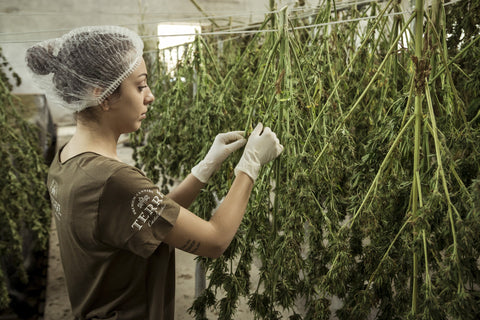 Because of the laws regarding the legality of cannabis and hemp, most full spectrum CBD products are made from industrial hemp, but not always. CBD can also be found in other cannabis plants, including high THC plants.
Because of the laws regarding the legality of cannabis and hemp, most full spectrum CBD products are made from industrial hemp, but not always. CBD can also be found in other cannabis plants, including high THC plants.
Still, since the main point of a full spectrum CBD product is the cannabidiol, manufacturers usually seek out CBD-rich hemp plants that contain very low levels of THC.
After the hemp material is selected, the manufacturer may use a number of extraction methods (Supercritical CO2 and Ethanol extractions are most popular) to collect a material called “crude oil.”
This oil generally carries the full-spectrum cannabinoid and terpene profile in similar proportions to the original plant material.
Crude oil also contains a number of other natural plant materials, like lipids, waxes, and chlorophyll. For full spectrum extract products, it’s possible to stop here, and the resulting product will often be green or brown in color with a natural, hempy flavor.
Some manufacturers take the extraction process further, creating a more refined full spectrum product that is free of some of the lipids and plant compounds that hold the hemp flavor.
There is no standard procedure for hemp extraction or manufacturing CBD products, and each brand uses a process that may slightly differ from the next.
Still, the process usually involves some combination of these methods:
Although not required to produce full spectrum CBD products, the last step in a high-quality CBD manufacturing process is batch testing through a third-party lab.
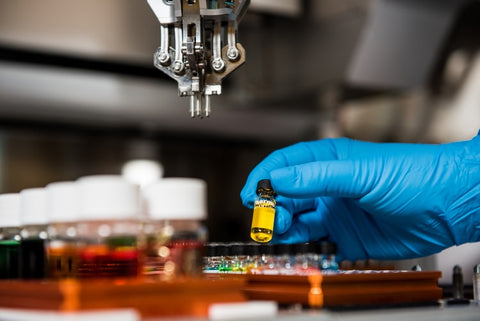 Many manufacturers tend to forgo these batch tests because they are costly. Unfortunately, this frequently allows things to slip through the cracks, like low potency or contaminants in the final product.
Many manufacturers tend to forgo these batch tests because they are costly. Unfortunately, this frequently allows things to slip through the cracks, like low potency or contaminants in the final product.
Skipping these tests may result in a lower-cost end product, but usually results in lower-quality products as well.
It also allows the manufacturer to escape significant accountability, since products can technically be labeled as “full spectrum CBD” if it contains any amount of other cannabinoids or terpenes.
In short, these third-party lab tests are important to ensuring the accuracy and safety of full spectrum CBD products, both for the consumer and for industry-leading manufacturers.
Consumers who seek out full spectrum CBD often look for these test results in order to ensure a complete, diverse cannabinoid and terpene profile.
Manufacturers value these lab tests as a way to hold themselves accountable for the quality of their product, and as a way to help establish consumer trust.
Some brands may test hemp material several times throughout the manufacturing process, but the final batch tests are frequently considered the most important because they directly display information related to the product consumers will receive.
Because of sparse industry regulations these tests are not mandatory, but they are becoming even more important as leading brands popularize the practice.
Many people like to buy their CBD products in bulk in order to save money, which begs the question—how long will full spectrum CBD last?
Unfortunately, there is no easy answer. The shelf life of any individual product varies based on things like purity, added ingredients, possible contamination during manufacturing, and more.
Choosing a high-quality CBD product that is well-made and free of contamination is the best way to ensure a lengthy shelf life. This highlights the importance of choosing a brand carefully.
Well made CBD products can last for months or even years. If you carefully vet and trust the brand you choose, you can also rely on them to provide accurate information about the product’s shelf life, too.
Because formulations are so diverse, the flavor of full spectrum CBD products varies greatly. The amount of “plant-flavor” that comes through to the final product depends on the type and amount of refinement processes used during manufacturing.
For instance, a common formulation for a standard full spectrum tincture is whole-plant hemp oil with MCT oil from coconuts. These tinctures usually taste mild and hempy, with an oily mouthfeel.
Some products may include added terpenes, essential oils, sweeteners, or flavors, which can alter the taste of the final product. Between gummies, tinctures, edibles, drinks, and more, there are limitless flavor options.
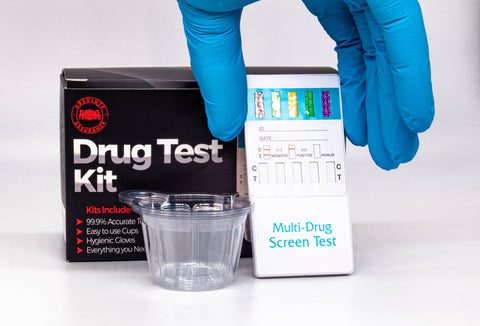 One of the biggest concerns behind using full spectrum CBD products is whether they will cause a failed drug test. These concerns aren’t unprecedented since full spectrum formulas can contain up to 0.3% THC, a psychoactive cannabinoid found on most drug testing panels.
One of the biggest concerns behind using full spectrum CBD products is whether they will cause a failed drug test. These concerns aren’t unprecedented since full spectrum formulas can contain up to 0.3% THC, a psychoactive cannabinoid found on most drug testing panels.
The US Drug Test Centers suggest that CBD products with only trace amounts of THC are unlikely to cause a failed drug test, but they don’t dismiss the possibility.
If you’re worried about taking CBD and are subject to drug tests at your job, talk to your employer about their policy regarding CBD. Many people use CBD products with no issues, while others prefer to opt for CBD isolate, since it features non-detectable (0%) levels of THC.
Full spectrum CBD products are hemp extracts that showcase hemp’s diverse cannabinoid and terpene profile. Many people suggest that these plant materials work synergistically, making full spectrum products more effective than their alternative, CBD isolates.
Full spectrum hemp extract can be used to make a wide variety of products, including tinctures, topicals, edibles, gummies, beverages, vape oils, and more.
There is no official research that defines the difference in effects or benefits between full spectrum and CBD isolate formulas. The two are possibly interchangeable, since they both can offer powerful doses of active CBD.
It is unlikely that trace amounts of THC found in full spectrum products will cause a failed drug test. However, many people opt for THC-free products to avoid this small risk.
Comments will be approved before showing up.



